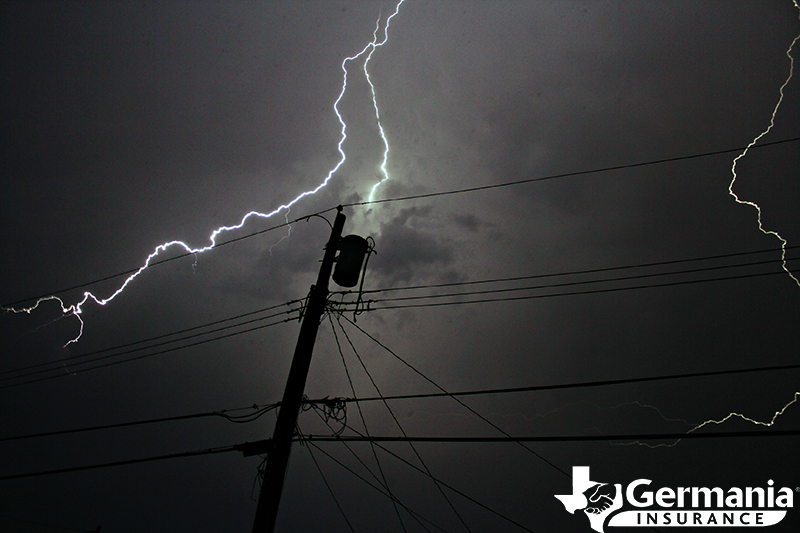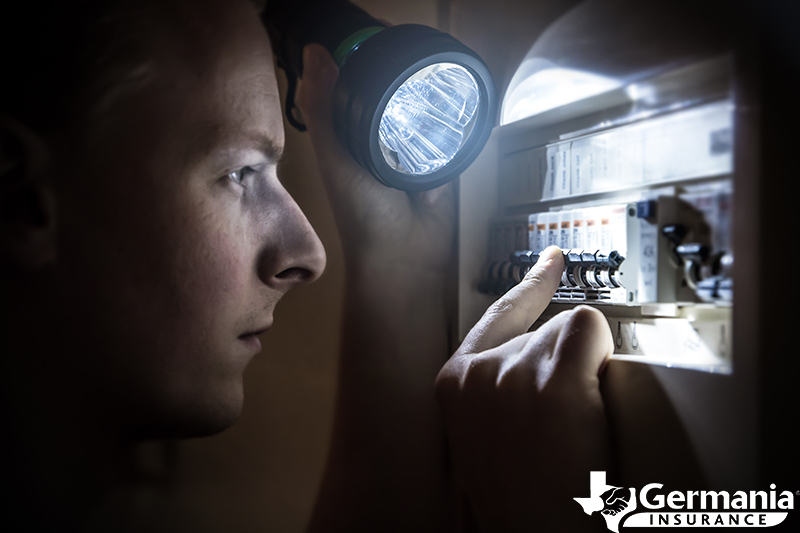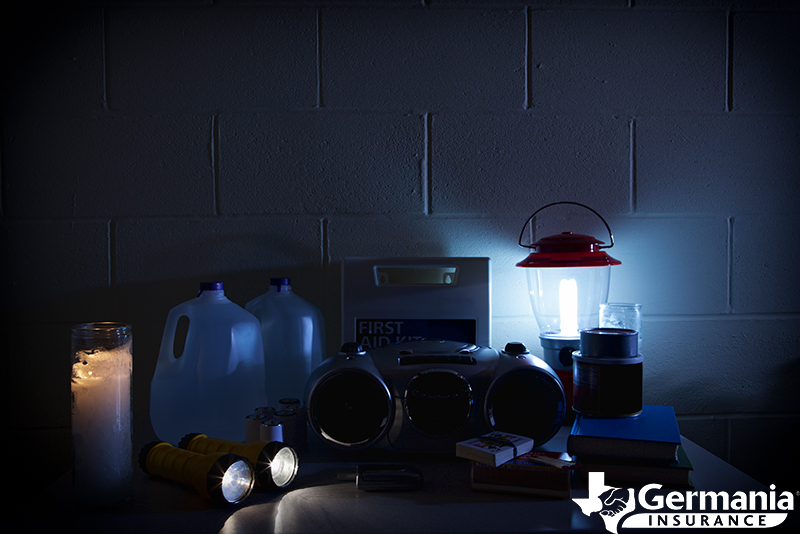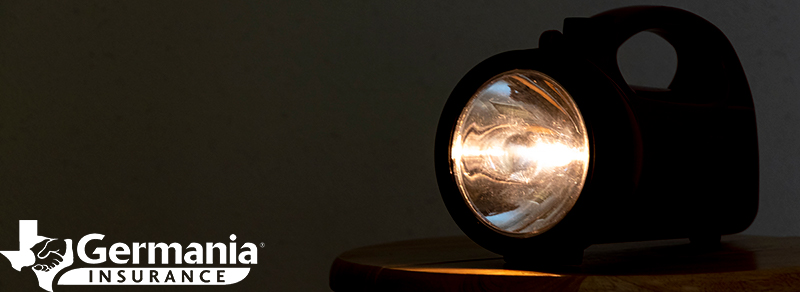Are you prepared for a power outage? Learn what to do the next time the lights go out!

It's easy to forget just how much we rely on power until that power is out. Recently, an
immense winter storm reminded us that electricity has become an essential part of our daily lives. But while we're in no danger of an ice storm any time soon, severe thunderstorms and hurricanes are just as capable of causing power outages.
With
hurricane season right around the corner and spring storms rolling in all the time, it's important to make sure you know what to do if and when the lights go out. That's why today, we'll discuss some helpful tips for getting through a power outage and steps you can take to prepare for the next one!
Identify the scope and scale of the power outage

When the power goes out, it can be hard to tell exactly what's going on at first. Is it just your house? Is the whole neighborhood dark? Or is this a much bigger, citywide problem? While you will be without lights during any of those circumstances, the steps you take next depend on exactly how widespread the outage is. That's why it's important to gather a little information.
Check the breaker box. Check your breaker box and look for breakers that might have tripped. If it appears as though some of them have, there should be a diagram on the inside of the panel to guide you as you flip them back on.
Check your meter. As long as it is safe to head outside, you can also check the electricity meter outside of your house. While they might differ based on the company that supplies the power, they usually have a small LCD screen that shows the reading. If it's blank, that means you have a local outage. However, if it is displaying information, that usually means the box is receiving power, which means any outage is caused by something downstream from that point (like a flipped breaker or faulty wiring).
Check the neighbors. Next, check with neighbors to see if they are also experiencing an outage. If all of your neighbors have power, then you can be reasonably certain that the problem is local to your house. However, if your neighbors are experiencing an outage as well, you'll want to call your power company to report it.
Call the power company. Outages that are limited to a neighborhood or smaller area are often caused by power disruption to the grid, like a blown transformer or power line damaged by wind or fallen limbs. Whatever the cause, calling your power company is important. If the outage is local, they may be able to send someone out to fix it. If it is more widespread, your report can help them understand the extent of the outage.
Intermittent power and rolling blackouts
A full black out refers to a situation where the power is completely out in a given area during a given period of time. A rolling blackout refers to a situation where power may come back for short periods of time before cutting off again.
Also known as rotational load shedding or feeder rotation, these are
intentional shutdowns "during non-overlapping periods over different parts of the distribution region." They are measures used when the demand for power from a given grid in a given area exceeds the current capacity.
This could be caused by a number of different scenarios. The storm could damage power lines or damage a the power plant itself. In either case, the result is that a particular area isn't getting enough power to meet the demand.
To find out if this is the case, you can call your power company, or you can start taking note of when the power comes on and when it turns off again. By doing this you may start to see a pattern. For example, you may see that your power stays on for 20 minutes, and then shuts off for another 15 minutes. It can be helpful to try and keep track of this, even if it is with a watch and a pen and paper.
Helpful tips to help you get through a power outage

In an ideal scenario, you might head to a hotel or a family member's house to ride out a longer outage. However, leaving your house to stay elsewhere isn't always practical and may not even be possible depending on the situation. Maybe you can't reasonably move your whole family, or perhaps the weather is too dangerous. It's even possible that there simply isn't a place with power in driving distance. Whatever the case may be, if you remain home during a power outage, there are a few things you'll want to do to get through.
Riding out the outage
Collect water. As soon as you can, begin to fill up whatever containers you have to store water, both for drinking and any other needs you might have. Although losing power rarely affects your plumbing directly, if the power outage is large enough, it could impact your local water treatment plant. In such a case, water from your tap may soon become unsafe to drink without boiling it first, so gathering drinking water while you can is important.
Keep your fridge closed. Even without power, your fridge can keep
food cold and safe for up to four hours - if you keep the door closed. Freezers that are full can last for 48 hours, or 24 hours if it is half full. If the power is out for more than four hours, you may need to move food to an ice chest with either ice or cold packs if possible.
Watch out for carbon monoxide (CO). You won't have to worry about CO from heating your home during the summer, and without your AC, you might not consider cooking indoors during a power outage. Still, it's important to be mindful of this odorless, colorless gas that's produced by burning material.
Don't fire up your outdoor grill in the garage or close to an open window. Don't use your camping stove indoors, or use a gas stove without ventilation. If you have a gas generator, make sure it's in a safe place so that the fumes don't make their way inside. Finally, if you don't already have CO detectors in your home, it's a good idea to do so.
Update your social media status. Although your internet options may be limited during a power outage, social media can be a great way to let your friends and family know what's going on.
For example, if you're worried that your phone may die or that you otherwise won't have the ability to accept calls, relaying that information to loved ones through a social media status can put their minds at ease.
Managing electronics during a power outage
Turn off and unplug electronics. If every AC system on the block kicks into gear when the power comes back on, it could easily overload the grid and cause the power to cut off again. That's why it's important to turn off any major appliances whether you're experiencing a full-blown blackout or rolling outages.
Some devices can draw small amounts of power even when they are supposed to be off. While one or two here and there won't make a huge difference, multiply that across dozens of households and it could easily be a problem. Unplug electronics like TVs and computers and switch off lights, lamps, and ceiling fans, too. You may want to consider leaving on a single lamp or light in a visible area so that you can immediately see when the power is restored.
Limit and prioritize device use. Even with batteries, you should do your best to limit device use to prevent draining the battery unnecessarily. If you have more than one phone, dedicate a single phone as the emergency contact device and leave it on while turning off the others. If the power remains out for a long time, this method will keep communication channels open for the longest possible amount of time.
If your internet dies with the power, your laptop may be useless as a communication device. If that is the case, leave your laptop off and only use it to charge your phone.
When you do use your device, stick to the essentials, like the news and weather websites, and even social media. Call friends, family, and neighbors to check in and let them know when and where they can reach you if your phone will be off.
Charge devices with your car. If you're in a pinch, you can often use your car to charge devices. Just make sure to be mindful of how long you charge it in case you need to use your car later. Lastly, don't run the engine while the car is in the garage - simply turn the key so that only the electrical systems are on.
Staying cool during a spring or summer power outage
As any Texan knows, a home without AC in the summer quickly begins to feel like an oven. Even with storm clouds potentially blocking the sun, the temperature in your home can rise to uncomfortable, and possibly dangerous levels.
Open windows and doors. As long as it won't let rain in, open exterior windows and interior doors to promote circulation.
Use a damp cloth. If you have running water, or have a little water to spare, soak a cloth or rag and drape it around your neck. The cool rag will absorb the heat from the blood in your arteries, which can help cool the rest of your body down.
Stay hydrated. Avoid sugary drinks and drink plenty of water, especially if you're sweating.
Take it easy. Be as still as possible, and don't overexert yourself. When you do need to move around, take it slow and take plenty of breaks.
Take a shower. If you have water, take a shower to cool down. Make sure to bring a lamp or flashlight, though - showering in the dark can be dangerous!
How to prepare for the next power outage

Like storms themselves, power outages can range dramatically in length and severity. Sometimes, you may not need anything more than a flashlight to get through a few hours of darkness. Yet others may persist for much longer and may require a greater degree of planning. To prepare for such an event, you'll want to keep certain supplies on hand and take certain precautions in advance.
Emergency supplies to keep on hand for a power outage
Food. It's easy to forget how much we rely on electricity to cook food. Obviously microwaveable food is out of the question during a power outage, but many people won't be able to use their stove and or range, either.
With older gas stoves, you could simply turn the gas on and light it with a match. However, it is likely that your modern gas stove uses electricity to regulate the gas flow, or as a safety mechanism. They are actually designed not to work without electricity to prevent unwanted leaks during major power outages.
For these reasons, it's never a bad idea to keep some non-perishable food around. Canned fruits and vegetables will last almost indefinitely, but you can usually keep dry goods, like peanut butter, crackers, and jerky, too.
Water. Don't wait until the last minute to buy bottled water at the store - they often sell out quickly. Instead, keep a number of larger gallon (or more) jugs on hand that you can fill up when the forecast predicts a major storm.
Water purification. Sometimes during a storm, you'll still have water, but perhaps the water treatment plant loses power. In that case, your tap will work, but you may not want to use what's coming out of it - unless you have a way to purify it. That's why it never hurts to keep a small water filter on hand for emergencies. Camping supply stores have a wide range of options that can turn contaminated water into sparkling clean water. Alternatively, you can also simply keep a large pot on hand to
boil water. Iodine drops and tablets work, too, but they give the water an unpleasant taste.
Hand sanitizer. It's always important to keep your hands clean, and if the water shuts down or is otherwise unsafe to use, you'll need a way to keep your hands free of germs.
First aid kit. Depending on the length of the power outage, a small medical situation can easily turn into something major if not treated. Furthermore, any task is made more difficult with an injury or illness, and a first aid kit can be made to treat many of them.
Flashlights and batteries. To help you navigate in the darkness, make sure to have plenty of fresh batteries, bulbs, and a good, bright flashlight. In fact, keep a few flashlights around just in case.
Electric lamps. Flashlights are great for some things, but if you need to light a larger space, an electric lamp can come in handy. Although people often use candles for this purpose, candles are dangerous and should be avoided if at all possible.
Radio. Hopefully, you're able to keep your phone charged, but if your battery does die or service is interrupted, you'll want to have some way to hear what's going on out in the world. A simple hand radio can pick up emergency broadcasts and operates for hours on batteries. You can even find radios you can power with a hand crank, although they often require quite a bit of effort to use.
Battery backup for computers and phones. Communication is a powerful tool, and is necessary during a power outage. Fortunately, there are plenty of battery backups available that can charge phones and even laptops. Just make sure to keep the backup charged!
Ice chests. As mentioned, your fridge will only keep your food cold for a number of hours when the power goes out. If the temperature in your fridge starts to rise, having ice chests can potentially help you keep items cold for a while longer. It may also be a good idea to have ice packs frozen and ready. Alternatively, you might be able to get bags of ice at the grocery store or a gas station.
Entertainment! Unfortunately, most of the latest entertainment devices we enjoy require power. Without electricity, it can be easy to go stir crazy, especially if the weather traps you inside. While it certainly isn't necessary from an emergency perspective, having books, playing cards, and board games on hand can help you pass the time while you wait for the lights to come back on.
Steps you can take to prepare you and your family
Charge devices ahead of time. Of course, you can't predict a power outage, but you can be prepared when a storm is heading your way. That's why it's important to try and keep your devices and batteries charged ahead of time.
Fill the grill. Although a power outage hardly seems like the appropriate time for a BBQ, a propane grill might just be the only method of cooking food you have. If you have an outdoor grill, make sure to keep it full or have a spare tank on hand. If you
love camping, your camping stove will work in a pinch, too! But remember, only use your stove in a open area as burning propane creates deadly carbon monoxide fumes.
Install a landline. Although most people don't use landlines anymore, and you may not have a use for one in everyday life, they don't rely on the power grid. They often still work even when power is out across the city.
Install solar power or gas generator. These can be expensive, but are very helpful. This is especially important if someone you live with has medical equipment that requires power. If that is the case, it is important to reach out to your power company beforehand to inform them that you have someone in your home that relies on power for medical devices. This will often put you on a priority list, and in an emergency, they will likely do their best to restore power to your area first.
Have cash on hand. With credit cards, smartphones, and
digital wallets, many of us hardly ever use cash these days. However, if the power goes out in your area, stores could easily lose their ability to process these forms of payment. If you need to pick up supplies (like bags of ice, for example) having a little cash on hand can be a life saver.
Fill your gas tank. Last, but certainly not least, if you think that a power outage might follow an upcoming storm, make sure to fill your vehicle with gas beforehand. Pumps may be out in your area if the power goes down, and it's important to have the ability to
evacuate if you need to.
 Prepare for the unexpected with an insurance policy from Germania Insurance! Request a quote online or call your local Germania Agent today!
Prepare for the unexpected with an insurance policy from Germania Insurance! Request a quote online or call your local Germania Agent today!